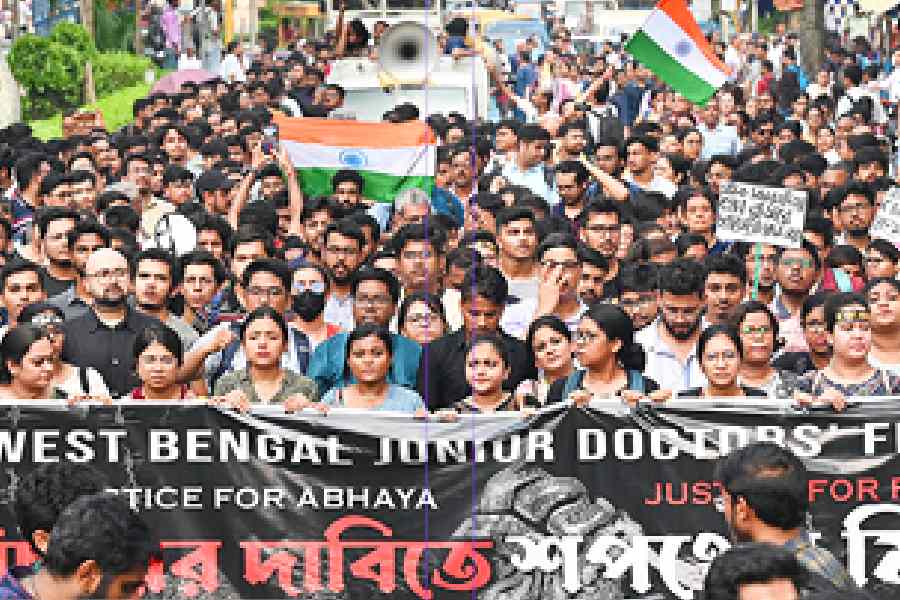Shortage of doctors, an old problem, has returned to haunt the state government and the acuteness of the crisis was laid bare by the long cease-work by junior doctors.
According to the state government’s figures, Bengal is at least 4,000 short of the number of senior doctors and specialists its hospitals need.
“There are 14,000 doctors in the state’s government hospitals and health centres. But there is a shortage of at least 4,000 doctors. The state’s medical colleges alone are short of at least 2,000 doctors,” a senior official of the state health department said on Friday.
According to him, there are around 3,500 senior doctors at the 26 government medical colleges. And there are 11,000 junior doctors.
That number alone explains the importance of junior doctors in Bengal’s healthcare delivery system.
“Among these junior doctors, about 3,000 are interns completing their MBBS degrees, the rest are senior to them. So, the government medical colleges have to rely on them heavily to provide services to patients,” said the official.
Among the senior doctors, there is a serious shortage of super specialists.
Metro has been reporting how many patients were denied treatment because of the shortage of doctors during the junior doctors’ 43-day cease-work that partially ended on Friday.
The Indian Medical Association, the largest body of doctors in the country, said it was the responsibility of the state government to fill up the vacant posts. “It is the responsibility of the state government to fill up the vacancies at government hospitals. They should do it through the public service commission. There are hundreds of doctors who apply for few posts,” said RV Asokan, national president of IMA.
“The junior doctors are students and lowest in the hierarchy. For years together these junior doctors are bearing the brunt of the vacancies and are overworked. The girl who died was on 36-hour duty,” he said.
Asokan said with several new medical colleges coming up in India every year, more than one lakh doctors are passing out.
He said it was a “systemic deficiency that governments are unable to recruit doctors adequately even though there is a surplus of doctors”.
“Many doctors are unemployed across India now,” the IMA national president said.
The agitating junior doctors also said the shortage of senior doctors led to additional work pressure on them.
“The National Medical Commission (apex medical regulator in India) has relaxed norms to set up medical colleges. So, the state government has also opened several colleges but did not hire as many doctors required to run them,” said Aniket Mahato, one of the protesting junior doctors.
“It is common knowledge that during inspections by the NMC, doctors from one medical college are often taken to another as a cover,” Mahato alleged.
“There has been no recruitment of general duty medical officers in the last four years,” he said.
“Because of inadequate senior doctors, we often have to work long shifts that extend to more than 36 hours. Many junior doctors start suffering from mental health issues and some have even committed suicide because of this work pressure,” he alleged.
Some of the senior doctors said that apart from the shortage, lack of monitoring by the health department on the performance of doctors is also another cause of deficient services.
“There is no proper monitoring of attendance of doctors, whether they are attending duty at a government hospital or doing private practice. If discipline is not implemented, then the over-dependence on junior doctors will continue,” a senior doctor said.
Health officials said recruitments take place in phases and they are trying to fill up vacancies.
A senior health department official said: “We recruit doctors in phases. At the same time, we are trying to address the work-related issues of junior doctors.”
The state’s chief secretary on Thursday sent a series of directives to the health secretary to ensure the “safety, security and efficient functioning of all healthcare professionals”.
These include: adequate duty rooms, washrooms, CCTVs and drinking-water facilities at hospitals as soon as possible. Also, that the Internal Complaint Committees be made functional at all the hospitals.











